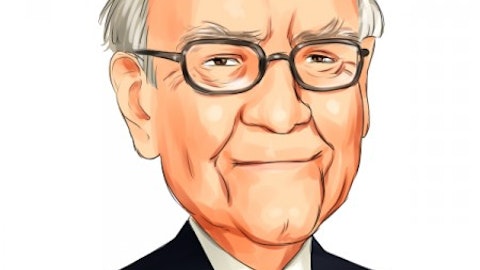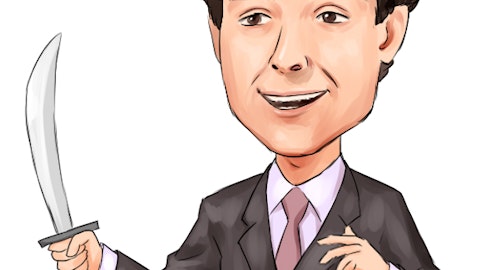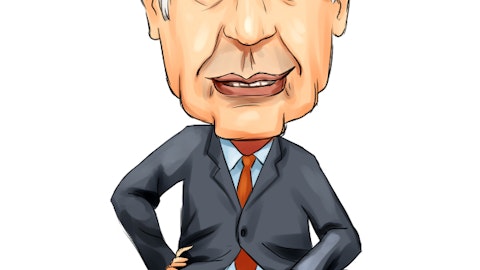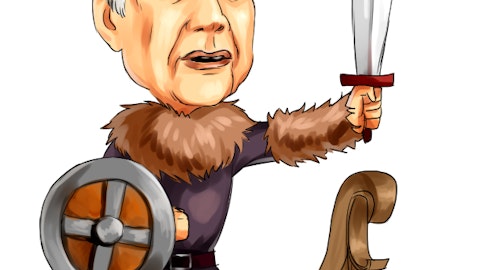Hedge fund managers like Bill Ackman and Larry Robbins shocked investors and other stock market watchers with their losses in 2015. Some hedge fund clients have been pulling capital out the hedge fund industry in recent quarters, as hedge fund managers face mounting pressure from investors to deliver expected returns. The typical hedge fund charges 2% of assets under management and 20% of performance, which means that money managers earn multi-million-dollar paychecks even when they lose money for their investors. However, these iconic hedge fund managers have outperformed broader market benchmarks for years and decades, earning them the benefit of the doubt when it comes to a stretch of underperformance, so it pays to keep track of all of these elite investors’ moves. For that reason, the following article will examine four SEC filings recently submitted by widely-known hedge fund managers like Jeffrey Ubben and Carl Icahn.
Our backtests that covered the period between 1999 and 2012, showed that following the 15 most popular small-caps among hedge funds can help a retail investor beat the market by an average of 95 basis points per month (see more details here).
According to a new Schedule 13D filing, Jeffrey Ubben’s ValueAct Holdings L.P. currently owns 8.11 million shares of Willis Towers Watson PLC (NASDAQ:WLTW), which account for 5.9% of the company’s outstanding shares. Created out of the freshly-completed merger of Willis Group Holdings and Towers Watson, Willis Towers Watson represents a $15.89 billion global advisory, broking and solutions company. Earlier this year, the aforementioned insurance brokers completed an all-stock merger of equals transaction, under which each share of Willis Group Holdings was converted into 0.3775 Willis Tower Watson shares. Following the completion of the merger at the beginning of January, ValueAct received approximately 6.95 million shares of Willis Towers Watson PLC (NASDAQ:WLTW) given that the friendly activist hedge fund owned 18.42 million shares of Willis Group Holdings at the end of December. Therefore, Mr. Ubben’s investment firm has upped its stake in the freshly-combined company by roughly 1.15 million shares since the completion of the merger. The recent 13D filing says that ValueAct purchased the shares of Willis Towers Watson based on the belief that they are undervalued by Mr. Market and represent an attractive investment opportunity. The SEC filing also reveals that Mr. Ubben serves on the company’s Board of Directors, and that ValueAct intends to engage with members of the management and Board to find means of enhancing shareholder value. These discussions may relate to the business of Willis Towers Watson, management, Board composition, operations, and capital allocation, among other things. It is important to note that the freshly-completed entity is anticipated to achieve $100 million-to-$125 million in cost savings within three years, which would involve the reduction of duplicate corporate costs and economies of scale. Shares of Willis Towers Watson PLC (NASDAQ:WLTW) are down by 7% since the completion of the merger.
Follow Willis Towers Watson Plc (NASDAQ:WTW)
Follow Willis Towers Watson Plc (NASDAQ:WTW)
Receive real-time insider trading and news alerts
In a freshly-amended 13G filing, Bruce Berkowitz’s Fairholme Capital Management LLC reported owning 6.78 million shares of NOW Inc. (NYSE:DNOW), which constitute 6.3% of the company’s outstanding shares. This represents a decrease from the stake of 7.19 million shares disclosed in Fairholme’s 13F filing for the fourth quarter. NOW is a global distributor to energy and industrial markets whose portfolio of product offerings includes consumable maintenance, repair and operating (MRO) supplies, pipes, valves, fittings, flanges, pumps, and mill tools, among other things. The company’s financial performance is highly dependent upon the level of global oil and gas drilling, and well remediation activity, which themselves rely on the prices of crude oil, natural gas and steel. Therefore, the 27% decline in the market value of NOW Inc. (NYSE:DNOW) in the past 12 months should not come as a surprise to investors. However, shares of NOW have gained 6% since the beginning of 2016, which might have created some exit points for Mr. Berkowitz and his team. NOW’s 2015 total revenue declined to $3.01 billion from $4.11 billion in 2014 and $4.30 billion in 2013. The company’s future prospects continue to be tied to worldwide rig count and drilling and completion expenditures, especially on the North American continent. The rig count in the U.S was 541 in mid-February, down from the average of 977 rigs in 2015 and 1,861 rigs in 2014. There were 16 hedge funds in our database with stakes in NOW at the end of December, which held slightly more than 24% of the company’s shares. Warren Buffett’s Berkshire Hathaway had 1.83 million shares of NOW Inc. (NYSE:DNOW) in its equity portfolio at the end of 2015.
Follow Dnow Inc. (NYSE:DNOW)
Follow Dnow Inc. (NYSE:DNOW)
Receive real-time insider trading and news alerts
Let’s head to the next page of this article, where we discuss two more SEC filings.
As revealed by a newly-amended 13D filing, Carl Icahn’s Icahn Capital LP owns 15.82 million shares of Hologic Inc. (NASDAQ:HOLX), which make up 5.58% of the company’s outstanding common stock. This is down from the 19.17 million-share position disclosed in Icahn Capital’s previous 13D filing on the company, discussed by Insider Monkey last week (read more details). The feared activist investor disclosed a double-digit percentage ownership stake in the Marlborough-based medical product company in late 2013, after which the investor pressured the company into appointing two Icahn designees, Jonathan Christodoro and Samuel Merksamer, to the company’s Board of Directors. Allegedly, the billionaire activist investor targeted Hologic Inc. (NASDAQ:HOLX) because he saw a promising company with great products run by incompetent people. “Hologic is the quintessential example of activism at its best. We commend Steve MacMillan [Chief Executive Officer of Hologic] for a job well done”, wrote the activist investor on Twitter earlier this year. Shares of Hologic are up by 60% in the past two years and by 5% in the past 12 months, so Mr. Icahn’s activist fund has earned a decent return on its investment in the company. Hologic operates as a developer, manufacturer and supplier of diagnostics products, medical imaging systems and surgical products, and is primarily focused on women’s health. The shares of Hologic currently change hands at 16.9-times expected earnings, versus the forward P/E ratio of 17.7 for the Healthcare Equipment sector. Hedge fund sentiment towards Hologic declined in the final quarter of 2015, with the number of funds invested in the company dropping to 33 from 38 quarter-over-quarter. Jim Simons’ Renaissance Technologies initiated a new position of 1.67 million shares in Hologic Inc. (NASDAQ:HOLX) during the December quarter.
Follow Hologic Inc (NASDAQ:HOLX)
Follow Hologic Inc (NASDAQ:HOLX)
Receive real-time insider trading and news alerts
Let’s wrap up our discussion by examining a new Schedule 13G filed with the SEC by a hedge fund vehicle run by Andrew Feldstein and Stephen Siderow. According to the fresh public filing, BlueMountain Capital Management LLC currently owns 2.59 million shares of Hanger Inc. (OTCMKTS:HNGR), which represent 7.2% of the company’s outstanding shares. This is up from the stake of 898,071 shares disclosed in BlueMountain’s 13F filing for the December quarter. Hanger Inc. (OTCMKTS:HNGR) is a provider of orthotic and prosthetic patient care, product distribution and therapeutic solutions. Earlier this year, the company received a letter from the New York Stock Exchange confirming that the NYSE had suspended trading of the company’s shares after Hanger Inc. failed to file its Form 10-K with the SEC. The delay in filing was associated with some accounting misstatements and other issues identified in the company’s financial statements and results. To be more detailed, the company said that a former employee purposely fabricated records used in the valuation of work-in-process inventory a few years ago. Moreover, the company said that certain former officers and employees might have been involved in inappropriate activities related to the establishment and use of an unsupported general reserve during the period of 2008 through 2012. Hanger’s shares have dropped by 73% in the past 52 weeks, while the number of funds invested in the battered company declined to five from 11 during the December quarter. John W. Rogers’ Ariel Investments owned 239,690 shares of Hanger Inc. (OTCMKTS:HNGR) at the end of December.
Follow Hanger Inc. (NYSE:HNGR)
Follow Hanger Inc. (NYSE:HNGR)
Receive real-time insider trading and news alerts
Disclosure: None





